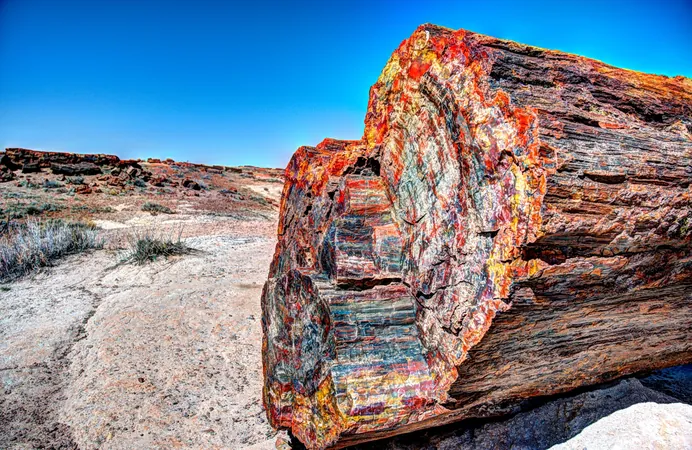
Ancient Forest Fossils Signal Urgent Climate Warning for Today
2025-07-04
Author: Yu
A Glimpse into Earth's Most Catastrophic Extinction
Imagine a time when lush tropical forests flourished across the supercontinent of Pangea, actively recycling carbon and maintaining climate stability. However, 252 million years ago, these verdant expanses faded into oblivion, marking the onset of one of Earth’s most devastating events: the Permian-Triassic Mass Extinction.
The Study That Uncovered a Climate Feedback Loop
A groundbreaking study from the University of Leeds, in collaboration with the China University of Geosciences, reveals that the vanishing of these forests not only led to ecological devastation but also set off a powerful climate feedback loop, resulting in intense "super-greenhouse" conditions that lasted for five million years.
Understanding the Great Dying
The extinction, dubbed the 'Great Dying,' wiped out over 90% of marine life and around 70% of terrestrial vertebrates, largely attributed to massive volcanic eruptions in Siberia that spewed carbon dioxide, heating the planet. But the research suggests that the continued high temperatures after the eruptions were largely influenced by the drastic loss of tropical forests.
A Call to Action from Ancient Ecosystems
Zhen Xu, the lead researcher, emphasized that this event stands as the only instance in Earth’s history where tropical forests collapsed amid extreme heat, driving their investigation. Using an extensive dataset of fossil records from China’s geological outcrops, they linked forest demise with a significant drop in carbon sequestration, which prolonged the heat and hindered the planet's recovery.
Decoding Earth's Climate System
The researchers analyzed sediment laid down during the extinction, unveiling a swift transition from lush ferns to sparse shrubland, all within a brief geological timeframe. Their findings suggest that the loss of photosynthesis capability alone could have accounted for the prolonged thermal plateau.
A Dire Warning for Today's Climate
Professor Benjamin Mills underscored a stark warning: Should modern tropical forests collapse due to rapid warming, we cannot expect our climate to revert to pre-industrial norms, even if we cease the emission of CO2. In fact, warming could continue to accelerate.
Lessons from the Past for Future Generations
This research highlights the essential role that forests play in maintaining Earth’s climate. When the biomass is destroyed through heat, drought, or acid rain, carbon storage vanishes, triggering potentially irreversible feedback loops. Such tipping points, historically evident in the Permian event, resonate with today’s ecological crises.
Rethinking Paleontology and Our Role in Conservation
As paleontology advances, researchers stress the importance of using modern tools such as chemical analysis and numerical simulations to understand ancient events. Experts like Hongfu Yin emphasize that the knowledge gained must extend beyond academia, impacting global conservation efforts.
A Message from China's Ancient Fossils
While we may not replicate the cataclysmic eruptions of the past, our activities are causing an alarming increase in atmospheric CO2. The lessons learned from the Great Dying reveal how quickly ecosystems can collapse, prolonging the climatic impact long after the initial causes fade.
Protecting Tomorrow's Ecosystems
The ancient fossils of China serve as a powerful reminder: Earth's climate has crossed critical thresholds before, with devastating effects tied to the loss of living landscapes. Protecting today’s tropical forests might be our best defense against reliving a five-million-year climatic crisis.
Read More on This Critical Study
This groundbreaking study is detailed in the journal Nature Communications, and it holds crucial insights for our battle against contemporary climate challenges.
 Brasil (PT)
Brasil (PT)
 Canada (EN)
Canada (EN)
 Chile (ES)
Chile (ES)
 Česko (CS)
Česko (CS)
 대한민국 (KO)
대한민국 (KO)
 España (ES)
España (ES)
 France (FR)
France (FR)
 Hong Kong (EN)
Hong Kong (EN)
 Italia (IT)
Italia (IT)
 日本 (JA)
日本 (JA)
 Magyarország (HU)
Magyarország (HU)
 Norge (NO)
Norge (NO)
 Polska (PL)
Polska (PL)
 Schweiz (DE)
Schweiz (DE)
 Singapore (EN)
Singapore (EN)
 Sverige (SV)
Sverige (SV)
 Suomi (FI)
Suomi (FI)
 Türkiye (TR)
Türkiye (TR)
 الإمارات العربية المتحدة (AR)
الإمارات العربية المتحدة (AR)